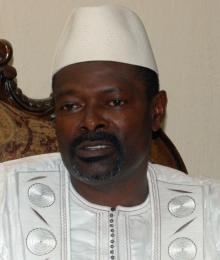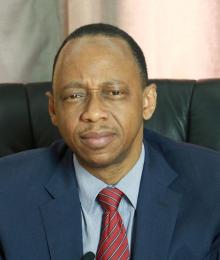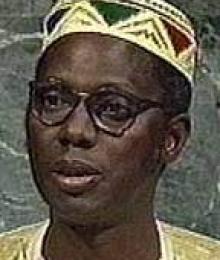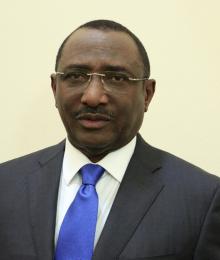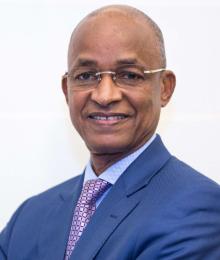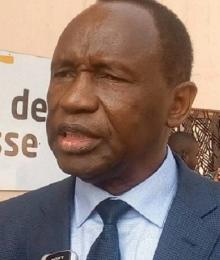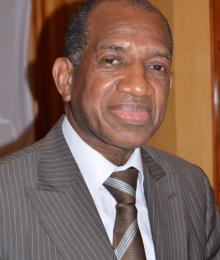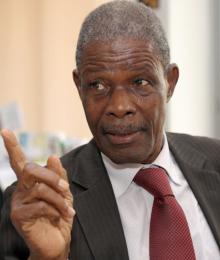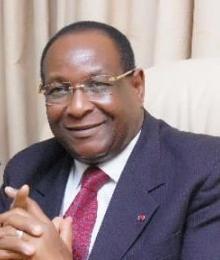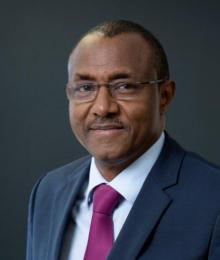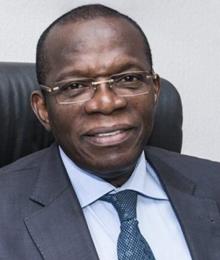
Ibrahima Kassory Fofana (born 1954) is a leading Guinean economist and statesman. From a modest background, he climbed the ladder of power to become one of the most influential men in the country. Minister under Lansana Conté, where he carried out ambitious economic reforms, he then experienced exile before rebounding to found his party.
Supporting and opposing Alpha Condé, he was appointed Prime Minister in 2018, a position from which he launched major social programmes. Defeated by a military coup in 2021, he briefly resumed the leadership of the presidential party before being arrested and tried for alleged corruption. A controversial character with spectacular fortunes, Fofana embodies the hopes and torments of contemporary Guinea.
Introduction
Ibrahima Kassory Fofana is an indispensable figure in contemporary Guinean politics. Born in 1954 in the villa of Forecariah in Lower Guinea, this trained economist has climbed the ladder of power to become one of the country's most influential men. His professional and political career was marked by remarkable successes, but also by reverses of fortune that made him a controversial character. From his beginnings as Deputy Director at the Department of International Cooperation to his ascension to the post of Prime Minister under Alpha Condé, to his exile in the United States, Ibrahima Kassory Fofana has had a turbulent trajectory that deserves to be traced back.
Education
Issu d'une famille modeste de paysans et d'imams de mosquée, Ibrahima Kassory Fofana a su tirer parti de ses capacités intellectuelles pour se frayer un chemin vers le sommet. Après des études primaires et secondaires dans sa région natale, il intègre la faculté de comptabilité de l'Université de Conakry, où il décroche son diplôme.
Professionnal career
In 1978, Ibrahima Kassory Fofana began a promising career in the Guinean administration. He is appointed Deputy Director of the Department of International Cooperation's Study Office, a position that enables him to become familiar with governance and to establish valuable links with international bodies.
Over the years, Fofana climbed the ministerial ranks, serving successively as Director General of International Cooperation in 1986 and Director General for Public Investments in 1991. His expertise in finance and investment also served as governor for Guinea at the African Development Bank from 1996 to 2000, and as administrator for Guatemala at the International Monetary Fund from 1998 to 2000.
Minister under Lansana Conté
It was under the presidency of Lansana Conté that Ibrahima Kassory Fofana experienced his real political flight. In 1994, he was appointed Minister without Portfolio to the presidency, responsible for the restructuring of state-owned enterprises as part of the transition of Guinea's economy to a liberal model.
Two years later, in 1996, Fofana became Minister of the Budget and the Restructuring of the Parapublic Sector, a key position that enabled him to implement ambitious reforms. Among other things, it has initiated an anti-corruption programme, a first in Guinea, which has resulted in arrests and prosecutions of executives involved in misappropriations.
In 1997, Ibrahima Kassory Fofana joined the strategic portfolio of Minister of Economy and Finance, which he retained until 2000. During this period, he managed the resumption of relations with the IMF and the World Bank, implemented the country's structural adjustment programme, and launched a comprehensive public service recovery programme, allowing substantial savings on the state's wage mass.
Exile in the United States
Despite his remarkable achievements, Ibrahima Kassory Fofana left the government in 2000, under controversial circumstances. Some refer to a conflict with the army over military spending, while others suspect a machination orchestrated by Lansana Conté's surroundings to remove him from power.
However, Fofana decided to go into exile, first to Senegal, and then to the United States, where he would spend several years away from the Guinean political scene.
Creation of the Guinea For All Party (GPT)
In 2009, after the death of Lansana Conté and the establishment of a military transition, Ibrahima Kassory Fofana returned to Conakry. He then founded the Party of Guinea for All (GPT), a political formation that is distinguished by its rejection of ethnic communitarianism, a recurring scourge in the Guinean political landscape.
2010 presidential election
With his new party, Fofana ran for the presidency in the country's first democratic election in 2010. Among the 24 candidates, it presents a programme focused on improving governance, decentralization and regional integration. Despite a dynamic campaign, he collected only 0.66% of the vote in the first round, reaching eleventh place.
In the second round, Ibrahima Kassory Fofana supported Alpha Condé, who eventually won the election with 52.52 per cent of the vote.
Alliance with the RPG
Despite Alpha Condé's support in the 2010 presidential election, Ibrahima Kassory Fofana quickly mixed up with the new head of state about the contested organization of the country's first democratic parliamentary elections. He then joined the opposition and actively participated in street demonstrations demanding transparency of the vote.
However, after the parliamentary elections in September 2013, when the GPT gained one seat out of 114, Fofana made a rapprochement with Alpha Condé, who requested it to help Guinea's economic recovery. Ibrahima Kassory Fofana then decided to make a "useful alliance" by joining the presidential camp.
Minister of State for Investments
In 2014, Ibrahima Kassory Fofana was appointed to the newly created post of Minister of State to President Alpha Condé, in charge of investment issues and public-private partnerships. (PPP). In this strategic role, it coordinates efforts at the national and international levels to mobilize the resources needed for the country's priority investments.
It is under its impetus that Guinea turns to new emerging partners, such as China, from which Fofana manages to raise $20 billion in investments.
Prime Minister
On 21 May 2018, Ibrahima Kassory Fofana reached the top of the executive power by being appointed Prime Minister of Guinea by President Alpha Condé. Its mandate is clear: to focus on social issues and to ensure better sharing of the fruits of economic growth.
In a tense socio-political context, marked by violently suppressed opposition demonstrations, Fofana banned rallies and strengthened the security system, declaring that he preferred "order to law".
Ambitious, it sets itself the goal of bringing 40% of Guineans out of extreme poverty by 2025, or about 6 million people. In order to secure the necessary budgetary margins, it is initiating a reform of fiscal governance to meet the economic challenge.
Implementation of socio-economic reforms
Once appointed Prime Minister, Ibrahima Kassory Fofana embarked on a comprehensive programme of socio-economic reforms. Concerned about ensuring "eating growth", as he likes to say, he is multiplying initiatives to combat poverty and improve the living conditions of the Guineans.
One of its main achievements is the allocation of 15% of the state's mining revenue to the municipalities of the country, through the creation of a local development fund. This measure aims to redistribute some of the national wealth to the benefit of the local population, often left behind despite the abundance of the country's natural resources.
On the fiscal level, Fofana is undertaking an ambitious governance reform, with the goal of increasing the tax pressure rate from 13.5% to 20% by 2025. This strategy should enable resources to be mobilized for the financing of social programmes and the development of infrastructure.
Confirmation as Prime Minister
Despite growing tensions with President Alpha Condé, known for his solitary rule, Ibrahima Kassory Fofana was re-elected as Prime Minister on 15 January 2021, following Condé's contested reelection for a third term.
However, the differences between the two men intensified, and Fofana deplored the lack of room for manoeuvre granted to him by the head of state in managing the country's affairs.
2021 coup d'état and dissolution of government
On September 5, 2021, a military coup brutally ended the reign of Alpha Condé and the government of Ibrahim Kassory Fofana. The coupists, led by Colonel Mamady Doumbouya, dissolved all the institutions of the Guinean state, including the government.
Fofana was thus removed from power, a collateral victim of a popular uprising against the authoritarian drift of the Condé regime.
Presidency of RPG-Arc-en-ciel
Six months after the coup, Ibrahima Kassory Fofana made a remarkable return to the political scene by taking over the leadership of the Rainbow RPG, the former ruling party. On 8 March 2022, he was appointed chairman of the "provisional executive council" of the formation, before being officially installed on 31 March 2022.
This appointment underscores Fofana's still considerable political weight, despite his recent removal from power. It also demonstrates his commitment to remain an indispensable player in Guinea's political life.
Arrest and legal proceedings
However, judicial troubles soon caught Ibrahima Kassory Fofana. On 6 April 2022, just a few days after taking over the reins of the RPG, he was arrested and placed under a custody warrant at the Central House of Conakry by the Court for the Suppression of Economic and Financial Crimes. (CRIEF).
Fofana is charged with alleged illicit enrichment and misappropriation of public funds, as part of a large-scale judicial operation targeting several senior officials of the overthrown Alpha Condé regime.
Initially, Fofana was scheduled to be released under judicial control for a fine of GBP 20 billion on 19 May 2022. But the CRIEF prosecutor eventually opposed it, now the former prime minister in custody.
Ongoing trial
In November 2022, the trial of Ibrahim Kassory Fofana and about 180 other members of the Condé regime opened before the CRIEF. The charges are numerous: corruption, illicit enrichment, money laundering, counterfeiting and the use of false public writing, misappropriation of public money and complicity.
This unusual trial, which could take several months, is being closely monitored by the Guinean public opinion, eager to see the light on the alleged malversations of the old government.
For Ibrahima Kassory Fofana, it is a new rebound in a trail of highs and lows, flashing ascents and brutal falls. Whatever the outcome of this trial, the former Prime Minister has already marked Guinea’s recent political history, both by his achievements and by his fortunes.
Conclusion
The journey of Ibrahim Kassory Fofana perfectly illustrates the difficulties of Guinea's political life, where fortunes can shift from day to day. This trained economist, from a modest background, has been able to harness his skills to reach the highest spheres of power.
An ambitious reformist under the chairmanship of Lansana Conté, then briefly exiled before rebounding on the political scene, Fofana subsequently experienced a flashy rise under the regime of Alpha Condé, becoming one of his closest collaborators before entering the post of Prime Minister.
But his passage to the top of the state was short-lived, interrupted by a military coup that swept over the current power. Since then, Ibrahima Kassory Fofana has alternated between remarkable returns, such as at the head of the RPG, and judicial troubles linked to the Condé regime's alleged drifts.
Whether acquitted or convicted in the vast ongoing trial, Fofana will remain a prominent figure in Guinea’s recent political history, a symbol of a nation seeking stability and socio-economic progress after decades of turbulence.











